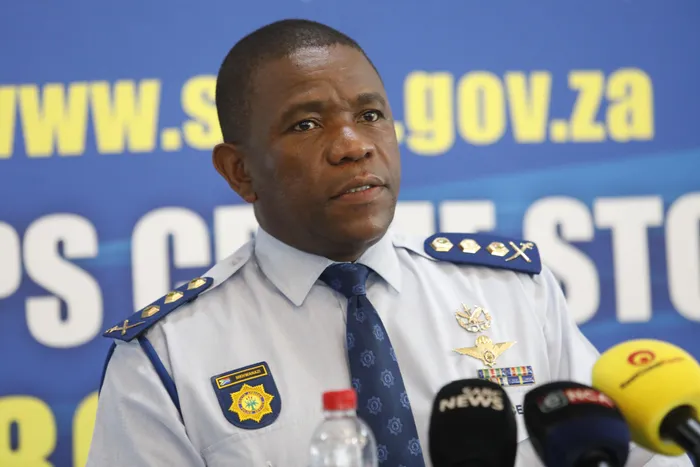
KwaZulu-Natal Police Commissioner, Lieutenant General Nhlanhla Mkhwanazi’s vow to defend the SAPS badge, even with his life, has sparked national debate, making him a fearless symbol of resistance against political interference in policing.
Image: DOCTOR NGCOBO/INDEPENDENT NEWSPAPERS
Step on the wrong side of the law, and he will deal with you. KwaZulu-Natal’s Provincial Police Commissioner, Lieutenant-General Nhlanhla Mkhwanazi, is no stranger to headlines, dropping bombs left, right and centre.
Mkhwanazi has long been regarded as a no-nonsense law enforcer with an unflinching stance on corruption.
His latest public outburst has taken his profile to new heights.
Once known mainly within policing circles, his name and face have now captured the public imagination, with many South Africans using his image as their display picture and hailing him as a fearless symbol of integrity.
This comes after an explosive press briefing where he declared he was “combat ready” to defend the integrity of the badge, even if it cost him his life.
According to the SAPS, Mkhwanazi joined the South African Police Service as a student constable in 1993. He rose through the ranks to Lieutenant General in 2011.
''Before being appointed acting provincial commissioner for KwaZulu-Natal, Mkhwanazi occupied several positions within the Service, including head of the Special Task Force (STF), Divisional Commissioner of Human Resource Development, and acting National Commissioner of Police.''
He holds a B-Tech degree in Policing as well as a National Diploma in Police Administration.
His words, directed at Police Minister Senzo Mchunu, ignited a national conversation about political interference in law enforcement, sparking intense debate.
“I am combat ready. I will die for this badge. I will not back down,” Mkhwanazi told the media during a press conference in Durban on Sunday.
This statement has since gone viral and turned him into a symbol of bravery and resistance for many on social media.
At the centre of the storm is a deepening rift between Mkhwanazi and Mchunu, following the controversial disbandment of the KZN political killings task team, a unit that had been investigating high-profile assassinations in the province.
Mkhwanazi, who was clad in the brown uniform of the STF and heavily armed with security, claims the task team was disbanded without his consultation and hinted at political interference from individuals close to Mchunu.
“Someone whispered to the minister to remove the team,he didn’t consult me or the National Commissioner,” said Mkhwanazi.
The fallout is the latest chapter in what observers now describe as a “dangerous power play” within South Africa’s law enforcement hierarchy.
Mkhwanazi, who has been wearing his police boots for over 30 years and once held a top position of the acting National Commissioner, has earned a reputation for internal discipline and for publicly confronting institutional rot.
His previous decision to suspend crime intelligence boss Richard Mdluli in 2012 for alleged misconduct showcased his willingness to challenge powerful figures.
In March this year, Mchunu lodged a formal complaint with the Independent Police Investigative Directorate (IPID), accusing Mkhwanazi of interfering in the arrest of a correctional services official with alleged links to a drug cartel.
However, Mkhwanazi dismissed the probe as a smear campaign designed to undermine his efforts to tackle politically connected crime networks.
“Every time I touch someone powerful, there is a backlash. This is not the first time they’ve tried to silence me,” he said.
The investigation sparked outrage from police unions and political parties alike.
The uMkhonto weSizwe Party, the EFF, and several civic organisations rallied behind Mkhwanazi, with some demanding Mchunu’s resignation and the reinstatement of the task team.
Mchunu has maintained a cautious tone throughout, recently telling the media.
“The decision on the renewal of Lt Gen Mkhwanazi’s contract lies with the National Commissioner, not me.”
However, that hasn’t stopped speculation that Mchunu and others in senior government circles are lobbying for Mkhwanazi’s removal ahead of the end of his term.
In a 2024 interview, Mkhwanazi made it clear he believes provincial police commissioners should have more authority to act independently, especially in politically volatile regions like KZN.
“We are not politicians. We are law enforcement. If crime has a political connection, that doesn’t mean we stop doing our jobs,” he told the newspaper, Mail & Guardian.
Public sentiment is sharply divided. While some civil society leaders have called for calm and institutional accountability, others have rallied behind him as a symbol of resistance against political interference in the SAPS.
Forensic investigator Paul O’Sullivan, however, criticised Mkhwanazi’s approach.
“I want that man to fall, and the sooner, the better,” citing what he called dangerous grandstanding and factional loyalties.”
Mchunu has however denied allegations of political interference made by Mkhwanazi, calling them “wild” and “baseless.”
Responding to claims that he disbanded the political killings task team and interfered in SAPS operations, Mchunu said: “I will never allow my integrity, that of the Ministry or SAPS, to be undermined by insinuations made without evidence.”
He confirmed that the commissioner’s remarks would be reviewed and that appropriate action would be considered: “All these public statements require an urgent, transparent investigation on a proper platform.”
Mchunu reaffirmed his commitment to the rule of law and tackling serious crimes, especially in high-crime provinces like KZN, Gauteng, Eastern Cape, and Western Cape.
hope.ntanzi@iol.co.za
IOL Politics
Related Topics: